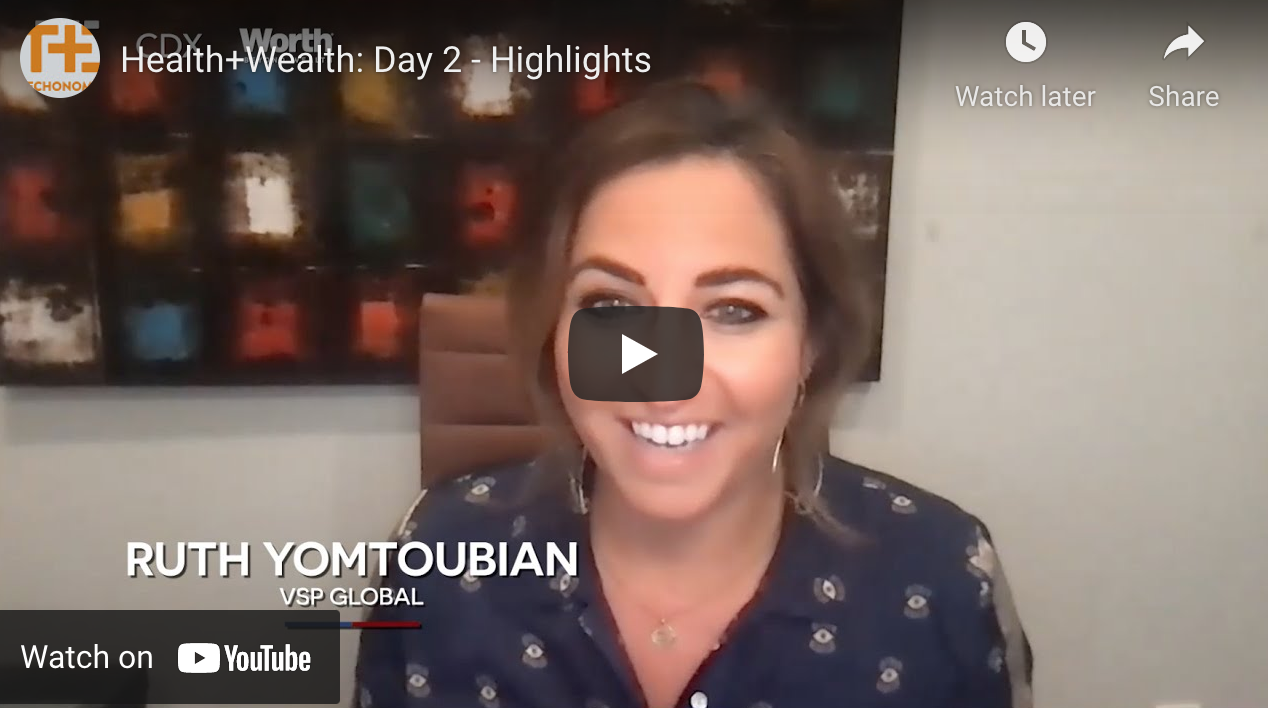“In order to solve the human progress issues—delivery of health care, delivery of education, infrastructure, climate change—there’s no doubt in my mind, we need economic growth,” said economist and author Dambisa Moyo at the opening of the second day of the of the Health+Wealth of America conference Wednesday. In a gripping conversation with Techonomy editor-in-chief David Kirkpatrick, Moyo, known for her clear, outspoken views on big and challenging topics, was eager to emphasize that our current economic situation requires context.
She notes that global forecasts for growth were already trending significantly lower pre-pandemic, so the global economy was already in a precarious situation before 2020. In addition to slowing growth rates and rising debt, “there’s been a confluence of economic factors dragging down prospects for growth—from climate change, to the risk of technology creating a jobless underclass, demographic shifts, both in terms of quality and quantity of the workforce,” Moyo explained. “And, of course, inequality.”

The pandemic accelerated breakdowns in global cooperation and a move toward deglobalization, she said, which is a major threat to the world’s economy. Having been born and raised in Zambia, Moyo sees everything through the lens of the need to bring up the entire world in order to avoid any part of the world, including the U.S. going into deeper crisis. She also said that if the U.S. is to retain its influence globally, and the liberal democratic and market-based capitalist model it espouses, it has to address its own problems better. Already many around the world, she said, will lean further towards admiration and emulation of the Chinese model.
“There’s obviously going to be some rethinking of globalization,” said Joseph Stiglitz, economics professor at Columbia University and Nobel Laureate, later that day. In conversation with Clarim’s chief content officer James Ledbetter, Stiglitz explained how today’s balkanization actually began, to a large extent, after the Great Recession of 2008. Some of it has to do with the natural evolution of moving from a manufacturing to a service sector economy.
“I think both the pandemic and climate change has made it clear we have to cooperate–you know, we share a planet,” Stiglitz said. “The greenhouse gas molecules don’t carry passports, don’t obey visas. It’s the same thing with the virus. These are things we have to deal with collectively—the same for dealing with the oceans and so forth.”

Not unlike Moyo, he cautioned against dismissing China. In reference to President Joe Biden’s work with it on climate change, he explained, “I sometimes give an analogy: If you were on the Titanic and it was going down, and you’re on a lifeboat, there may be some people in that lifeboat who you really don’t like. But you still are going to row together for safety. So, we are at risk. It’s really important for us to work together on those areas.”
Other themes that emerged during the discussions: the urgent need for resiliency, cooperation, innovation, and connection. Jonathan Bush, executive chairman of healthcare disruptor Firefly Health, spoke about how digital transformation is connecting patients to accessible, market-based health care solutions. His company serves as both insurer and provider, reducing costs even as it offers patients far more access to doctors and support. Daisy Dowling, author of WORKPARENT: The Complete Guide to Succeeding on the Job, Staying True to Yourself, and Raising Happy Kids, discussed the pandemic resilience of working parents and how businesses have to be more cooperative and flexible with employees in a post-pandemic future. Ruth Yomboutian, Head of VSP Global Innovation Center, was joined by two experts to discuss using advancements in the complex world of vision as a tool for personal performance and health at a greater scale. Among other projects aimed at sustainability, productivity, and new materials, the VSP Global Innovation Center is focused on using tech to create more personalized patient experiences. And Eric Braverman, chief executive of Schmidt Futures, explained how the nonprofit is connecting with and cultivating talent from across the globe and generations. Among other things, it is identifying 100 15-17 year-olds globally who it will help send to college and commit to ongoing support over their lives, in hopes they will contribute to solving major global problems.
In a session on mental health co-moderated by 1-800-Flowers.com’s Jim McCann, Dr. George Everly, professor at Johns Hopkins Center for Humanitarian Health, brilliantly summed up my biggest takeaway from the conference so far: “We find the single best predictor of human resilience is connection to others. Intuitively, we know we want connection; the human brain is wired to know that we want connections. Then, we have a higher portion of our brain that calls all of this into question. COVID represents an opportunity to get past some of that doubt.”
As Stiglitz explained, there’s hesitancy to address some of the world’s most pressing societal issues, such as climate change and racism when the economy remains weak. But, he said, the cost of inaction is far greater than doing something. Sometimes, we just need to start by connecting.














